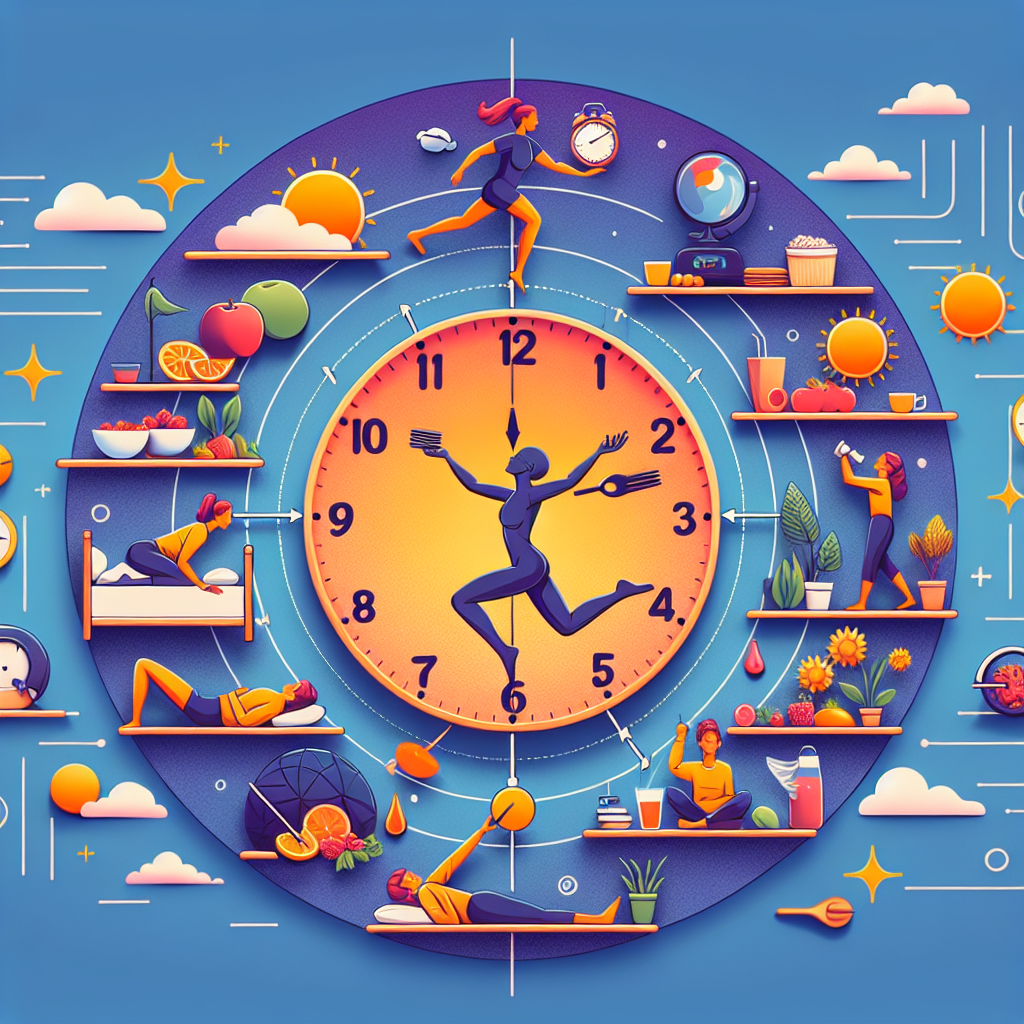How to Stay Energized All Day Without the Crash

Discover the secrets to staying energized all day without the crash! Learn effective strategies and tips on our website. Don’t wait, start your journey to a more vibrant and energetic life today. Click here to get started.
Maximizing Your Energy: How to Stay Energized All Day Without the Crash
In today’s fast-paced world, maintaining a high level of energy throughout the day is a common challenge. Many of us rely on caffeine or sugar to get us through the day, only to experience a crash later on. However, there are healthier and more effective ways to stay energized all day without the crash.
Firstly, it’s essential to start your day with a balanced breakfast. Consuming a meal rich in protein, fiber, and healthy fats can provide a steady release of energy throughout the morning. Foods such as eggs, whole grains, and avocados are excellent choices. They not only keep you satiated but also help to stabilize your blood sugar levels, preventing energy spikes and crashes.
Transitioning into the mid-morning, it’s crucial to stay hydrated. Dehydration can lead to feelings of fatigue and lethargy. Therefore, drinking plenty of water throughout the day can help maintain your energy levels. If you find plain water unappealing, consider adding a slice of lemon or cucumber for a refreshing twist.
As we approach the afternoon, it’s common to experience a slump in energy. Instead of reaching for a sugary snack or caffeinated beverage, opt for a short, brisk walk or a few minutes of stretching. Physical activity, even in small doses, can significantly boost your energy levels. It increases your heart rate, circulation, and oxygen supply to your brain, leading to increased alertness and concentration.
When it comes to lunch, opt for a meal that combines lean protein with complex carbohydrates. This combination provides a slow and steady release of energy, keeping you alert and focused throughout the afternoon. Foods such as grilled chicken with brown rice or a tuna salad with whole grain bread are excellent choices.
As the day progresses, it’s important to take regular breaks. Working for long periods without a break can lead to mental fatigue, reducing your productivity and energy levels. Taking short breaks every hour or so can help to refresh your mind and maintain your energy levels. During these breaks, consider doing a quick mindfulness exercise or deep breathing to reduce stress and increase focus.
As we approach the evening, it’s essential to have a light dinner. Eating a heavy meal can lead to feelings of sluggishness and fatigue. Opt for a meal that is rich in vegetables and lean protein. This will provide you with the nutrients you need without weighing you down.
Finally, getting a good night’s sleep is crucial for maintaining high energy levels. Aim for 7-9 hours of sleep per night. A lack of sleep can lead to feelings of fatigue and low energy the following day. Establishing a regular sleep schedule and creating a relaxing bedtime routine can help to improve the quality of your sleep.
In conclusion, staying energized all day without the crash is achievable with a few simple lifestyle changes. By eating a balanced diet, staying hydrated, incorporating physical activity into your day, taking regular breaks, and getting a good night’s sleep, you can maintain high energy levels and avoid the dreaded afternoon slump. Remember, it’s not about quick fixes but about creating sustainable habits that support your overall health and wellbeing.
Avoiding the Afternoon Slump: Tips for Sustained Energy Throughout the Day

Staying energized all day without experiencing the dreaded afternoon slump can seem like an elusive goal. However, with a few strategic lifestyle adjustments, it is entirely possible to maintain a steady level of energy throughout the day. This article will provide you with some practical tips to help you avoid the afternoon slump and enjoy sustained energy from morning till evening.
Firstly, it is essential to start your day right. A balanced breakfast is the cornerstone of sustained energy. Consuming a meal rich in protein, fiber, and healthy fats can provide a slow, steady release of energy throughout the morning. Foods such as eggs, whole grains, fruits, and nuts are excellent choices. Additionally, staying hydrated is crucial. Dehydration can lead to feelings of fatigue, so ensure you’re drinking enough water throughout the day.
Secondly, regular physical activity is a proven energy booster. Even a brief bout of exercise can result in a significant increase in energy. A brisk walk during your lunch break, for instance, can help stave off the afternoon slump. If you’re unable to fit in a workout during the day, consider incorporating more movement into your routine, such as taking the stairs instead of the elevator or parking further away from your destination to get in some extra steps.
Next, it’s important to consider your eating patterns. Consuming smaller, more frequent meals throughout the day, rather than three large ones, can help maintain steady blood sugar levels, preventing energy spikes and crashes. Including a mix of protein, complex carbohydrates, and healthy fats in each meal can further enhance this effect.
Moreover, it’s crucial to be mindful of your caffeine intake. While a cup of coffee can provide a quick energy boost, relying on caffeine to get through the day can lead to energy crashes later on. Try to limit your caffeine consumption to the morning hours and opt for decaffeinated or herbal teas in the afternoon and evening.
Another key factor in maintaining energy levels is getting enough sleep. A lack of quality sleep can leave you feeling drained and sluggish the next day. Aim for seven to nine hours of sleep per night and try to keep a consistent sleep schedule, even on weekends.
Lastly, managing stress effectively can also contribute to sustained energy. Chronic stress can be physically and mentally exhausting. Incorporating stress-reducing activities into your daily routine, such as meditation, yoga, or deep-breathing exercises, can help keep your energy levels stable.
In conclusion, maintaining sustained energy throughout the day is a multifaceted process that involves a balanced diet, regular physical activity, mindful eating patterns, controlled caffeine intake, adequate sleep, and effective stress management. By making these lifestyle adjustments, you can avoid the afternoon slump and stay energized from morning till evening. Remember, it’s not about drastic changes but rather about small, consistent steps towards a healthier lifestyle. With time and consistency, you’ll find yourself feeling more energized and productive throughout the day.
Boosting Your Stamina: Strategies for Maintaining Energy Levels Without Crashing
Staying energized all day without experiencing the dreaded energy crash is a challenge many of us face. Whether you’re a busy professional, a student, or a parent juggling multiple responsibilities, maintaining high energy levels throughout the day is crucial. Fortunately, there are several strategies you can employ to boost your stamina and keep your energy levels steady.
Firstly, it’s essential to start your day with a nutritious breakfast. Consuming a balanced meal in the morning can provide you with the necessary fuel to power through your day. Opt for foods rich in protein, fiber, and healthy fats, such as eggs, whole grains, and avocados. These nutrients are digested slowly, providing a steady release of energy that can help you avoid mid-morning slumps.
In addition to a healthy breakfast, regular meals and snacks throughout the day can help maintain your energy levels. Rather than three large meals, consider five or six smaller meals or snacks. This approach can prevent blood sugar spikes and crashes, which often result in feelings of fatigue. Foods with a low glycemic index, such as nuts, seeds, and legumes, are excellent choices as they release energy slowly and help keep you feeling full and focused.
Hydration is another critical factor in maintaining energy levels. Even mild dehydration can cause fatigue and impair concentration. Aim to drink at least eight glasses of water a day, and more if you’re physically active or live in a hot climate. Herbal teas and fruit-infused water are also good options if you find plain water unappealing.
Physical activity is a powerful energy booster. Regular exercise increases blood flow, improves heart health, and boosts mood, all of which contribute to higher energy levels. You don’t need to run a marathon or spend hours at the gym to reap these benefits. Even short bursts of physical activity, such as a brisk walk or a few minutes of stretching, can make a significant difference.
Sleep is another crucial aspect of energy management. A lack of quality sleep can leave you feeling drained and sluggish the next day. Aim for seven to nine hours of sleep per night and try to maintain a consistent sleep schedule. This can help regulate your body’s internal clock and improve the quality of your sleep.
Lastly, managing stress is essential for maintaining energy levels. Chronic stress can leave you feeling exhausted and overwhelmed. Incorporating stress-reducing activities into your daily routine, such as meditation, yoga, or deep breathing exercises, can help keep your energy levels stable.
In conclusion, maintaining high energy levels throughout the day without crashing is a multifaceted process that involves a balanced diet, regular physical activity, adequate hydration, quality sleep, and stress management. By incorporating these strategies into your daily routine, you can boost your stamina and stay energized all day. Remember, it’s essential to listen to your body and adjust these strategies as needed. Everyone is unique, and what works for one person may not work for another. With a bit of trial and error, you can find the best approach to maintaining your energy levels and avoiding the dreaded energy crash.